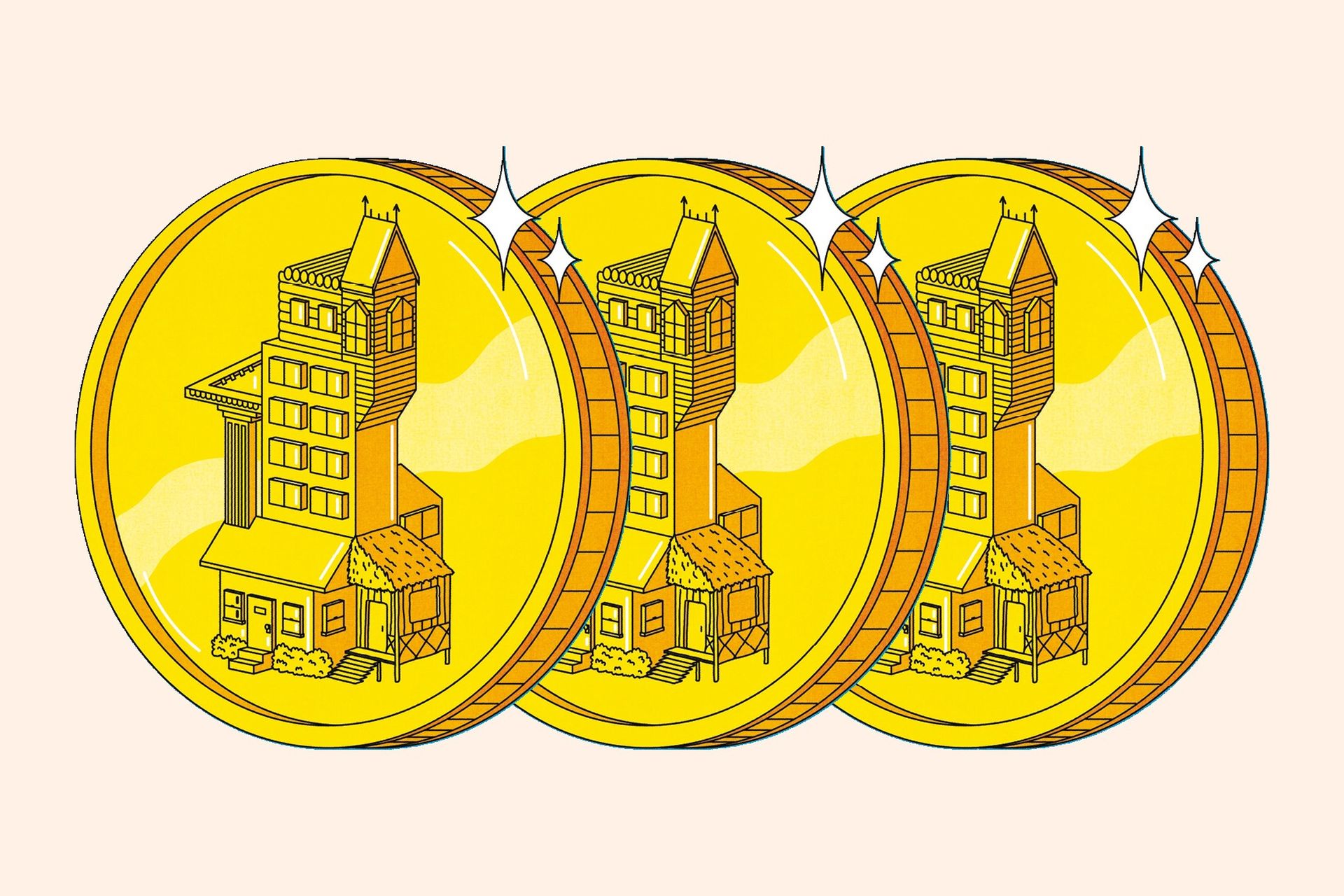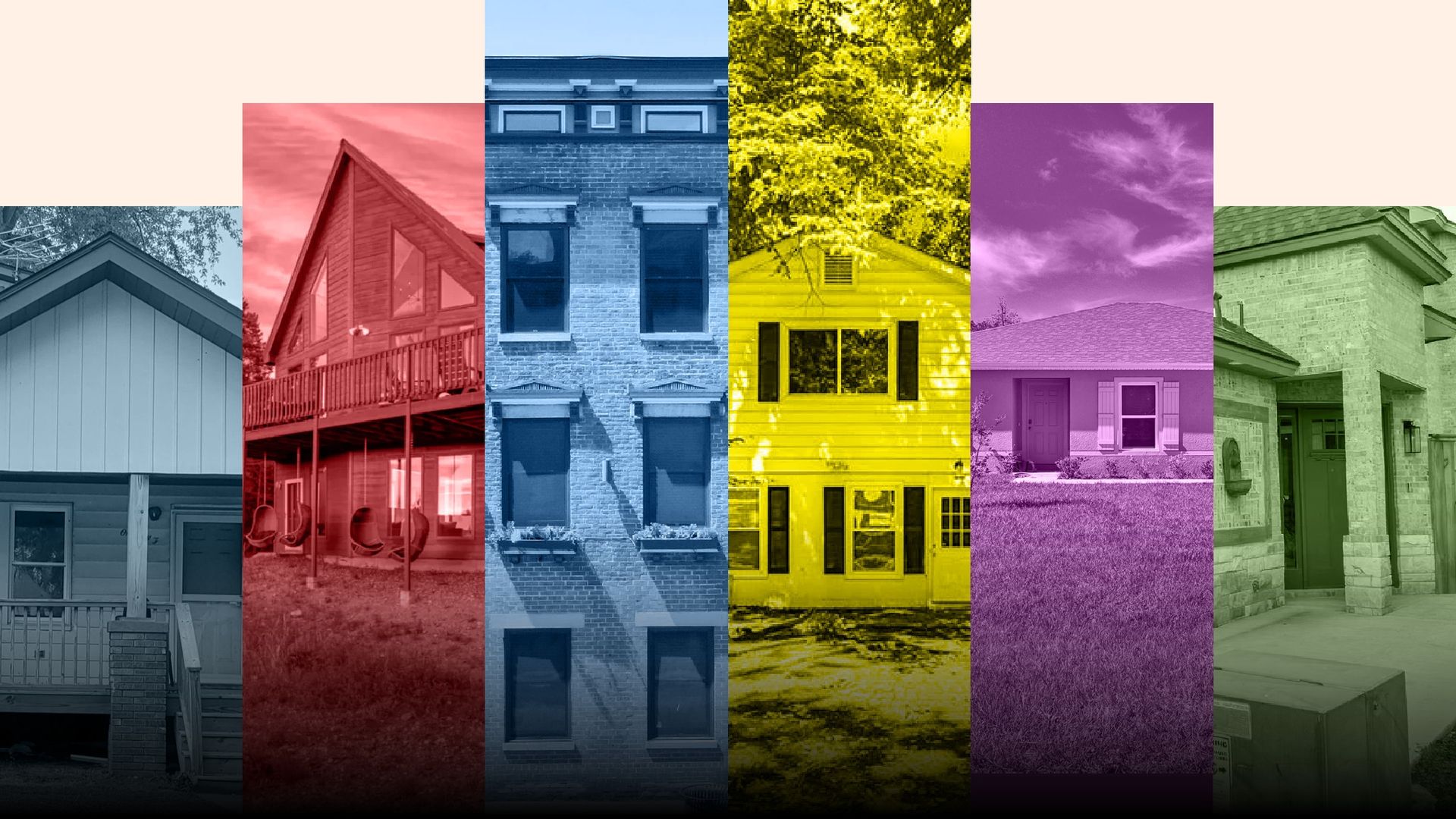
Retired banker Rick Phillips likes investing in property. But instead of putting down a deposit for a place he has seen, or investing money into funds listed on the stock market, the cryptocurrency enthusiast chooses to buy digital tokens that represent ownership of physical properties.
The Los Angeleno is one of a small number of investors testing the waters in property tokenisation, a nascent way to invest in rental real estate that gives would-be buyers the ability to hold a digital sliver of a bricks-and-mortar building. So far, Phillips has invested $20,000 across several properties.
Property tokenisation companies such as Lofty, RealT and HouseBit offer a range of buildings to invest in, using either cryptocurrency or standard bank deposits.
Born from crypto and blockchain’s promise to democratise finance and broaden financial access, the niche investment method is slowly gaining popularity among crypto fans seeking new areas in which to invest their funds and use blockchain technology — and as high house prices in large cities like London and New York make investing in property outright increasingly unaffordable for many.
“It’s a different way to invest because it has a lower threshold to getting into buying real property,” says Phillips, who owns “slices” of 12 tenanted properties, mainly in Ohio and Memphis.
The enterprise sounds promising, offering a way to own a slice of a property and benefit from its potential to rise in value and its incoming rents. But there are a host of issues. Not least, investors complain, difficulties selling tokens and problems arising from tenant issues.

Tokenised real estate promises a tangible way to invest small amounts in individual properties, rather than in real estate investment trusts (REITs), which typically own or finance large groups of commercial and residential buildings. “Real estate is a very emotional asset class,” says Jerry Chu, founder of Lofty. “REITs exist and funds exist [but] people seem to be a lot happier about ownership when they can say, ‘It’s this address, I own it because of these reasons.’”
An asset such as a house or hotel is sliced into digital tokens that represent ownership. Each token can hold information such as the asset’s ownership history, trading and regulatory details, and the tokens live on a blockchain, which essentially acts as a digital record keeper.
Tokenisation is taking off on Wall Street — BlackRock, Franklin Templeton and Fidelity International are among the asset managers exploring tokenising funds in order to make it cheaper and easier to move assets, but these are largely only available to institutional investors, not individuals, and none involve cryptocurrencies; asset managers are still wary.
“It’s really the question of convenience because the asset becomes liquid, it becomes tradable 24/7, and a global pool of investors have access to it,” says Max Dilendorf, a New York-based digital assets lawyer, adding that the retail market for tokenised products is “slowly developing”.
Tokenising illiquid assets globally could create a market worth between $2tn and $16tn by 2030, according to estimates from McKinsey and Boston Consulting Group. Tokenised home equity alone could be worth $3.2tn, BCG estimates, and enable “borderless” access, by allowing investors from around the world to hold slices of illiquid assets that are otherwise difficult to own.
“The folks that tend to be interested in tokenised products are individuals that are crypto-forward or interested in the applications of blockchain technology,” says Melissa Bender, a partner at law firm Ropes and Gray. “They’re potentially getting exposure to asset classes that are less accessible to them.”
Mathew, a 42-year-old from Toronto has invested $1,250 in six homes through Lofty, including family homes in Ohio, Chicago and Florida. “I am involved in some other crypto projects . . . [but] cryptocurrency is very volatile so I put my assets into something a little bit more stable,” he says. “I’ve always wanted to own my own place but in the conditions now I can’t do it — getting a downpayment is difficult.” He has made a roughly 10 per cent return over two years.

Founded in 2018 in Miami, Lofty is backed by Y Combinator, the Silicon Valley start-up incubator that spawned companies including Airbnb and the crypto exchange Coinbase. Property sellers list their buildings on the website and Lofty creates a company registered in Wyoming for each one, making tokens representing the ownership, each valued at $50. The site has tokenised more than 181 properties to date.
Jordan Bentley, who founded an advertising company, owns three rental properties as well as his own home in Utah, properties which he says are worth about $2mn. This summer, he sold 10 per cent of one investment property on Lofty, raising $30,000 to fund buying a new family home. He says selling a slice of the home was cheaper than taking out a loan against a property at high interest rates, and a better decision than selling a property outright to raise cash.
“The main downside of real estate historically has been the complete lack of liquidity,” says Bentley. It took “a couple of days” to sell the tokens, and the money was paid to him in the form of USDC, the world’s second biggest stablecoin, a form of digital cash that tracks the price of a reserve sovereign currency (in this case, the US dollar). He then transferred it to his own bank account as dollars.
After investors buy in, each token holder has voting rights in proportion to the number of coins they own, so they can contribute to making decisions about running the property, which are carried out by local property managers, hired by Lofty. “We want to be the Nasdaq of real estate,” says Chu, whose company charges a 3 per cent fee on buy and sell orders for tokens. “Real estate transactions have traditionally been very paperwork heavy . . . we want to update it so it’s a 21st-century process,” he adds.

Many of Lofty’s first homes were in poorer neighbourhoods and low income housing; investors reported issues with rent arrears, evictions and maintenance problems. The company has recently changed tactics and is encouraging homeowners and Airbnb hosts to list portions of their properties. Rents from the Airbnb visitors are more consistently paid out to investors.
Available properties include a seven-acre ranch house with space for 40 horses in California; an eight-bedroom wood-beamed cabin in Vermont, rented through Airbnb to skiers; a rustic cabin nestled in the Colorado mountains on an acre of land; and a three-family brick townhouse rented to tenants in upstate New York.
Phillips, an early investor with Lofty, says he stopped investing in houses in Chicago after rents on his properties there dwindled. “They would have tenant problems and maintenance problems so the cash flows weren’t steady on them.” He adds: “In Chicago, the laws are so renter favourable that when you have a tenant that stops paying rent, it’s very hard to evict them.”
Jean-Marc Jacobson, who co-founded RealT in 2019, says that his company is working on creating rental insurance that would pay out to investors if tenants stop handing over rent.
Buildings in need of maintenance can also see investors lose out. Each house has a so-called operating reserve on Lofty, essentially a fund worth about 5 per cent of the property’s total value, which is used by the local property managers to spend on maintenance. If the fund loses more than half of its value, investors typically replenish it using their rental income. Rent — when it is collected — is paid into investors’ Lofty wallets in the form of USDC, which they can withdraw to their bank account or crypto wallet.
Ownership and trades are recorded on the blockchain, which the companies say makes it easier for bringing in investors from around the world. “On a $100,000 property we have about 600 token holders from about 80 different countries,” says RealT’s Jacobson.
One significant problem in the nascent market is the lack of secondary buyers. This raises the risk of getting stuck with an investment, or selling at a loss. “I haven’t sold the tokens,” says Jon Steven, who has invested about $28,000 in eight properties. “The secondary market is so thin that it’s hard to get a good price . . . You’ll see a trade for tokens at $30 and then Lofty will still say the tokens are worth $45.”
“Liquidity is always a concern,” says Bender. “Until there are more participants, you are [still] going to be facing the challenges of holding an illiquid asset.”

Steven, a 40-year old software engineer, owns and rents out two houses himself in California and Oregon, has about $150,000 worth of crypto investments, $200,000 worth of equities, and “dabbles” in peer-to-peer investing with about $10,000. Investing in tokenised properties allowed him to expand his real estate interests. “I own other properties outright but it’s hard to come up with a lot of money sometimes . . . If I ever find myself with some extra money, rent payments from Lofty, I can reinvest it,” he adds. He has made a return just shy of 6 per cent. (The S&P 500 is up 24 per cent so far this year.)
Reinvestment is often easier than selling individual tokens.
While all tokens on Lofty are created at a value of $50, not all coins, or houses, are equal. Phillips says the ease of selling tokens on Lofty depends on the individual property — and how other investors on the platform assess its potential by reading the financials provided, which can include rental history and Airbnb income, as well as understanding the location and maintenance level of the house.
“Anyone can come and list a property,” says Chu, adding that the company filters out bad actors. “We run background checks on the sellers, we filtered out people with mortgage fraud in the past.”
Inevitably, being able to invest in properties with crypto raises significant issues such as money laundering and the reliability of customer checks that the tokenisation companies must address — US regulators continue to clamp down on crypto companies and traders acting illegally.
RealT co-founder Jacobson says the average investor holds less than $100,000 on his platform. “If you go over $100,000 then there are further questions, [and requests for] more information about where the money comes from,” he adds.
“We are seeing more and more demand from foreigners who want to buy bricks and mortar in the US,” says Benoit Laliberté, chief executive of HouseBit, adding that there is plenty of demand from “people who want to move quickly in the US [market]” and do not want to “go through the problem of banks”, underscoring crypto’s attraction as a tool for money laundering. The anonymity of crypto payments makes them highly attractive for moving money across the world without being detected.

Investing in property in this way has a lot of downsides. But positive inspiration for the housing market might come from the hospitality industry, where hoteliers are also eyeing the prospect of selling portions of their buildings as tokens to investors.
In Colorado, the St Regis Aspen Resort sits at the foothills of the mountains and draws thousands of skiers every year. Stephane De Baets, owner of the luxury resort, sold nearly 20 per cent of the hotel through digital tokens to around 1,000 investors in 2018, a move he said was cheaper than raising new finance. He is now looking to link the coins to a real-life use for investors: if an investor wants to book a room, they can redeem their equity whenever they like, in exchange for a 20 per cent reduction on the room rate, based on 2024 rates.

“The owner has a lower cost of capital, and the investor gets a discount on what he would have paid for the room,” he says, adding: “If you’re a family and come skiing every year here, you won’t have a downside unless the room rate crashes, but then, guess what, you and I have bigger problems.”
A life-long Aspen visitor, non-profit consultant Steve Orr invested $100,000 in tokens of the hotel. “It’s an interesting concept and a very effective way to get into the Aspen market, which is crazy,” he says. He looked to buy a place in the town but “the minimum price was $12mn, and that needed $4mn worth of work”.
“We’re renting hotel rooms so if we could in perpetuity have a fixed price, that’s pretty attractive stuff,” Orr says.
Whether property tokenisation takes off or remains a niche way to invest depends partly on whether investors can shake off the taint that comes with holding tokens and trusting their money to the blockchain.
“It still has a stigma,” admits Chu, adding that new investors have plenty of worries. “We constantly get new users who are afraid of blockchain and afraid they’re going to get hacked and lose all their money.”
Orr is more positive: “You’re holding a totally non physical asset [backed by] a physical asset . . . To me the crypto element is window dressing, it’s really just a stock in my mind.”
Nikou Asgari is the FT’s digital markets correspondent
Find out about our latest stories first — follow @ft_houseandhome on Instagram